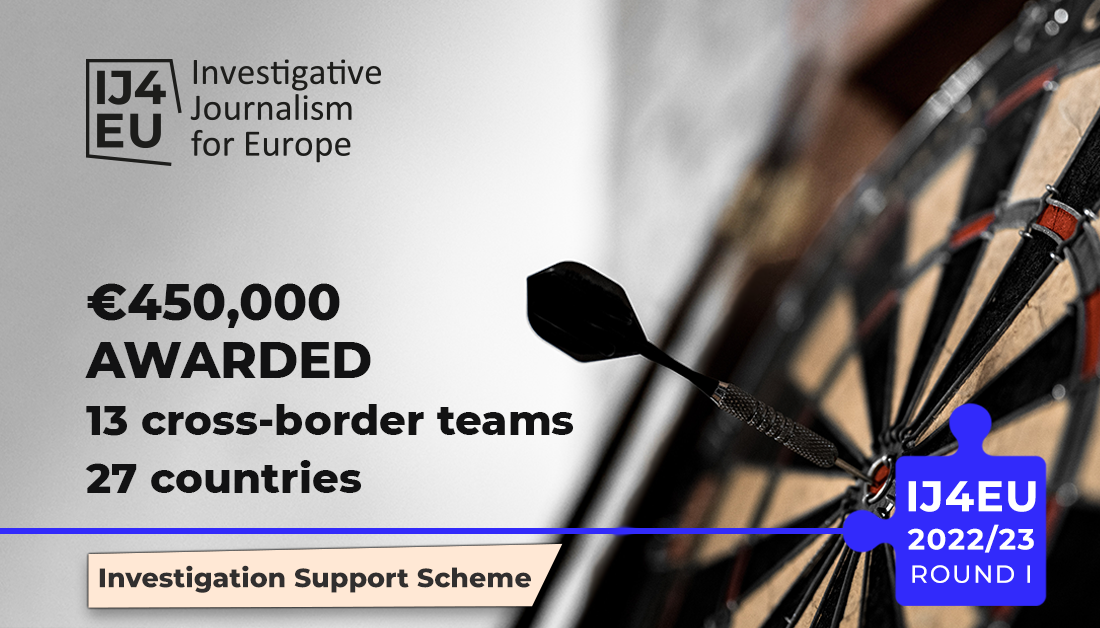An independent jury has awarded a combined €450,000 to 13 cross-border reporting teams under the latest call for the IJ4EU fund’s Investigation Support Scheme.
The grants will allow journalists based in the European Union, EU candidate countries and beyond to collaborate on topics ranging from surveillance, security and sanctions-busting to energy, pollution, trafficking and land grabs.
Run by the Vienna-based International Press Institute (IPI), the Investigative Support Scheme is the flagship grant programme of the Investigative Journalism for Europe (IJ4EU) fund, now in its fourth edition.
In 2022/23, the scheme will disburse €900,000, offering grants of up to €50,000 to journalistic teams probing transnational subjects of public interest. The next call will open in January 2023.
The awarded projects
In no particular order, the successful projects chosen under the latest call were:
- A cross-border investigation led by Solomon into how European age assessment policies are systematically violating international asylum law – €34,989
- A cross-border investigation led by Investigate Europe and Disclose into a big European oil corporation – €45,000
- A documentary led by The Black Sea into criminals taking refuge in Europe – €50,000
- A cross-border political investigation in Central and Eastern Europe – €14,688
- An investigation into harmful chemical pollution and the battle by industry to prevent strict regulation – €39,123
- An investigation by a team of journalists and researchers in five countries documenting the misuse of EU funds – €37,500
- A cross-border investigation into the tools used by the EU to stop migrants on their way to the bloc’s borders as it turns a blind eye to human rights abuses – €42,000
- A cross-border investigation into the dumping of European plastics waste into one of the most vulnerable countries in the world – €45,000
- An investigation into a hidden yet critical part of the global spyware scandal, in North Macedonia and Greece – €14,875
- An investigation by The Recovery Files team into who benefits from the Recovery and Resilience Facility, and if milestones necessary to receive funds are an incentive to reform or just a box-ticking exercise – €30,000
- A cross-border investigation led by Le Courrier des Balkans shedding new light on human trafficking at the gates of the European Union – €25,700
- A cross-border investigation into so-called economic restriction processes and their legal frameworks of practical application within the EU – €45,000
- An investigation into what happened behind closed doors in the months leading up to the Belarus-EU border migrant crisis – €25,000
Editorial independence sacred
The Investigation Support Scheme runs in parallel to a separate IJ4EU funding and mentoring scheme designed primarily for freelancers. Grantees of the Freelancer Support Scheme will be announced on November 9.
Editorial independence is the cornerstone of both schemes. IJ4EU’s financing model allows public and philanthropic money to support world-class investigative journalism in Europe without any question of editorial interference.
Most of IJ4EU’s coffers come from the European Commission, distributed via a consortium of independent intermediary organisations led by IPI. The other consortium members are the Maastricht-based European Journalism Centre and the European Centre for Press and Media Freedom in Leipzig.
Independent juries of senior editors and investigative journalism specialists are key to the integrity of the selection process, guaranteeing a firewall between IJ4EU’s donors and grantees.
Since its inception as a pilot scheme in 2018, IJ4EU has allocated around €3 million in grants to cross-border investigative projects, allowing hundreds of journalists across Europe to tackle ambitious investigations in the public interest.
Under the latest round of calls for the Investigation Support Scheme and Freelancer Support Scheme, 118 investigative teams with journalists based in 45 countries applied for a combined €3.99 million in funding.
Successful teams chosen under the Investigation Support Scheme had journalists based in 19 EU member states and three EU candidate countries, plus six nations further afield.
The Investigation Support Scheme’s five-person jury — whose identities will be kept secret until the results of the next call are made public in the spring of 2023 — chose the projects according to criteria including newsworthiness, cross-border relevance, the strength of research and publication plans and financial need.
Check out our projects section to learn more about investigations previously funded by IJ4EU.
